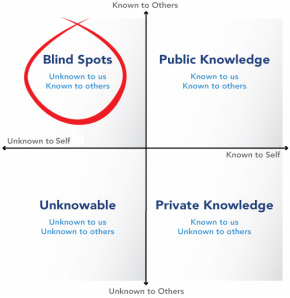 Most times of the year in Michigan - huddling up is usually a means of staying warm. In a business setting however, that might pose an HR issue so huddle up, but not in the traditional sense. Using a daily face to face huddle can be an effective way to stay in contact with your team, monitor progress, call and analyze plays, and keep the ball moving forward, Huddles can be 10 minutes or 30 minutes, the point is to keep them brief, but meaningful. The huddle should be more than just task management, it should also be an opportunity to brainstorm, reward, and collaborate. They need not be limited to your own immediate team either. I've used a combination of weekly, bi-weekly, even monthly huddles with executives and other directors to keep a finger on the pulse of the rest of the organization and their priorities. Have some fun with your huddles - give them code names, have everyone stand up instead of sitting down, go outside (weather permitting of course), have guests join from time to time - mix it up. One of my peers and I called our weekly huddles our PIAG (poop in a group). Agendas are optional, but when you are first starting it may be helpful to build a brief simple agenda until the rest of the huddlers get the rhythm. 5 tips for effective huddles:
0 Comments
Life happens. Sometimes it happens at breakneck speeds. This week was one of 'those' weeks. The kind that blurs by you and you reflect at the end of it and wonder, "How did all of THAT fit into one tiny week?" I won't go into all the details, yet suffice it to say that Evernote and Outlook are this girl's BFFs! Let's jump into the lesson, shall we? Lesson of the week: 1. Think like a boy scout: Be prepared. One of my dear friends and colleagues suggests that you work ahead two days. Most people get a chuckle out of that and then say, "yeah right?" He goes on to say that each of your activities falls within one of four categories: Urgent and Important, Urgent not as Important, Important not as Urgent, and Not Important Not Urgent. A reasonable way to look at things for the most part. What is missing here, in my opinion, is the OTHER person's categorization. I like to use the concepts of the Johari window to understand that often, what you know and understand as public knowledge, may in fact be a blind spot. In our hurried block and tackle lives, there are a lot of missed opportunities to drill into and make absolutely sure that all parties agree on the priority, deadline, expectations and critical success factors of any given activity. We rely on email to get the message across and act as a audit trail, yet miss the fact that the intended audience is likely not reading the message or skimming it on a 3"x 4" cell phone screen. How can we be so disconnected in our always connected world?
Back to the lesson. Knowing that there are multiple players and channels for communication means making a multi-tiered plan for all communications. Even - GASP - in person and on the phone. Make a check list in advance, here is one that I like:
If you have not personally answered each of these questions - you likely have created your own blind spot. There will be a question that needs to be answered that has not been thought of or asked - so keep asking. Being prepared means you know that there will be unanswered questions or gaps and trying to anticipate those to prevent an emergenc.y. Or in the words of Sir Robert Baden-Powell (founder of the boy scouts): “Be Prepared... the meaning of the motto is that a scout must prepare himself by previous thinking out and practicing how to act on any accident or emergency so that he is never taken by surprise.” Don't let others create an emergency that takes you by surprise. Be Prepared. |
AuthorWith a decade plus of experience as a brand ambassador and chief sloganista, I am fascinated with customers and their customers. Ever curious, I love to analyze data, talk to people and seek to know "Why?" Archives
March 2023
Categories
All
|




 RSS Feed
RSS Feed
